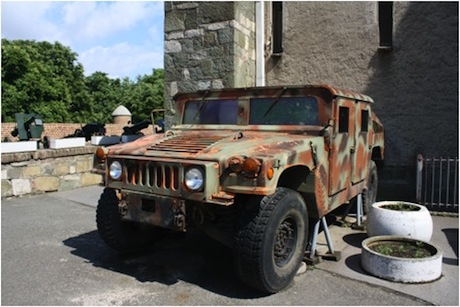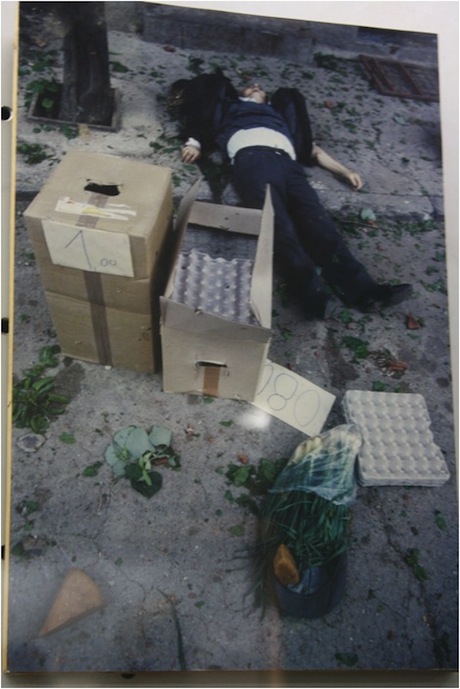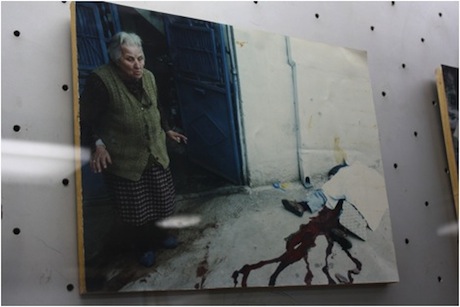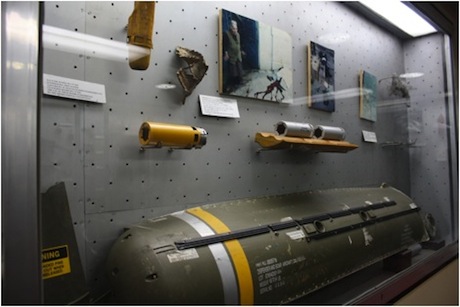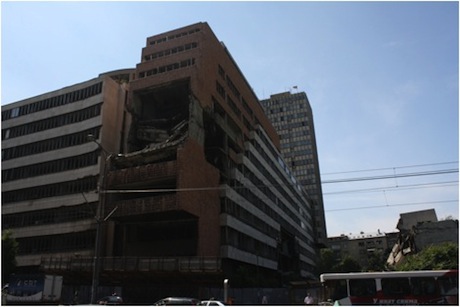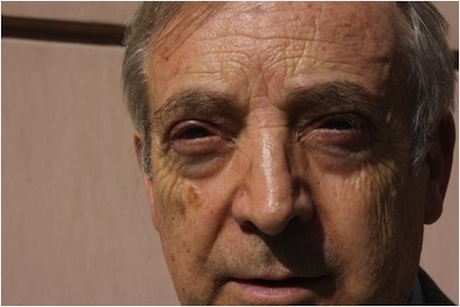Who: Brian Turner
What: The Federal Association of Globetrotters
When: April, 2010
Where: Belgrade, Serbia
“Open Door” features audio, video, and online media to document dynamic interactions between poetry and its audience. “Open Door” showcases performance, scholarship, and engagement outside the usual boundaries of slams, workshops, and book publications. This week: The Federal Association of Globetrotters in Belgrade.
To cure my insomnia on this, my first night in Serbia, I’m channel-surfing between CNN and a large number of music video channels featuring scantily clad women singing Turbofolk: a fusion of traditional Serbian folk music blended with the cheesiest of Europop synth work. After songs by Stoja, Dragana Mirkovic, Lepa Brena and the black-gloved mega-Turbo-star Ceca, I flip the channel and stumble on a late-night movie broadcast in English, with Serbo-Croat subtitles: Jeff Daniels starring as George Washington in The Crossing. American.
I fall asleep.
I crossed the Sava River by bus this afternoon—from the city of Brcko, in northern Bosnia-Herzegovina—and now find myself in what was to me the land of the “enemy” just a few years ago. Please don’t get me wrong. I’m doing my best to approach Serbia with an open mind. Still, I enter the country with some reserve, some big questions. And I imagine those I meet may well have their own big questions about me—not only as an American, but also for having served as a NATO peacekeeper in the Balkans from 1999 to 2000. (I arrived in Bosnia-Herzegovina just as the war in Kosovo came to an end, the last of the NATO bombs dropping in the month prior to my unit’s deployment.)
Belgrade’s Kalemegdon citadel (the city’s ancient fortress) rises on a promontory overlooking the confluence of the Danube and Sava rivers. War Island rests out in the waterway, in view of the towering pedestal of stone that serves as the victory monument. Serbian soldiers huddled on that island in valiant defense of their city as Austro-Hungarian troops did their best to conquer Belgrade in World War I; the island is a peaceful green park now, with tourist-filled beaches in the summertime. The Military Museum lies just inside the citadel walls. A rusting American humvee (HMMWV) is parked as a trophy exhibit beside the museum entrance—it’s the same vehicle I remember reading about after its capture, along with three U.S. Army soldiers, by Serb forces on the Kosovo border. (While serving in Bosnia, I was a .50 cal gunner and rode through my fair share of convoys up in the swivel hatch of a similar humvee.)
[A side note: To this day, the Serbian government does not recognize the border between Serbia and Kosovo as an international border.]
Photo by Brian Turner
It’s an odd thing, seeing the world from another’s eyes. As I walked up to the Military Museum on Kneza Mihailova—one of the main shopping streets, which was packed with people—I couldn’t help but think I recognized Ratco Mladic, the Serbian militant wanted for war crimes. The Serbian government has posted a nontaxable reward of two million euro for his capture, but so far he remains at large. The United States has offered an additional $5 million reward for information leading to his capture. Mladic’s cohort, Radovan Karadzic, was living in plain sight in Serbia as an alternative health care guru prior to being caught and sent to The Hague. I imagine those under indictment and as yet uncaught walking the streets beside me now, calm and cool on the outside, troubled within. As I’ve said, I’m trying to approach the Serbian people with an open mind. And yet here I am wandering the streets looking for war criminals, searching for the guilty. Or maybe just looking for guilt alone.
One of the rooms within the Military Museum exhibits the uniforms and equipment of the three captured American soldiers. There is a portion of a downed plane identified as part of an American stealth bomber shot down during the war in Kosovo. There are multiple exhibits of the “illegal” weapons of the “terrorist” fighters in Kosovo (speaking of the Kosovo Liberation Army, or KLA, the group allied with NATO). There are also these photographs:
Photos by Brian Turner
The placard beside them reads (in Serbian and with the following English translation):
“At the mid of the day on May the 7th 1999, NATO aircraft dropped two cointainers [sic] of clustered bombs on an area of the town of Nis; 16 persons were killed and 27 wounded.”
Here’s a photograph of the full display:
Photo by Brian Turner
The caption reads: “Clustered bombs BLU 97 B/B
The use of these bombs is prohibited by the international conventions.”
*
I didn’t find a single exhibit relating to the war in Bosnia-Herzegovina (which occurred during the breakup of the former Yugoslavia, from 1991 to 1995). Nothing about Srebrenica, where over 8,000 Bosniak men and boys were killed in July 1995 by Bosnian Serb forces in what the International Court of Justice and the United Nations’ war crimes court have designated an act of genocide. Nothing about the siege of Sarajevo, which lasted from April 1992 until February 1994. (According to the final report of the U.N. Commission of Experts, “It has been estimated that over the course of the siege the city [was] hit by an average of approximately 329 shell impacts per day, with a high of 3, 777 shell impacts on 22 July 1993.”) Admittedly, it’s not surprising that the museum doesn’t exhibit these things—I imagine cultural memory, as expressed in military/war museums, being similar around the world. Which American museum, for example, will be the first to create a display exploring the events at the Abu Ghraib prison complex in Iraq?
When I visited a classroom at the Nicola Tesla Technical School in Koslovac, Serbia, I spoke a bit about the initial bombing campaign in the first Gulf War—as part of the conversation rising out of my own poems. As the conversation progressed, I remember thinking that talking about the bombing might, in an oblique way, open them up to their own history, their own bombing campaigns. One of the professors chimed in to me, with a tone that was respectful and yet carried an icy message beneath it, “Yes. We know this type of bombing. We have experienced it here, too.”
Here’s a photo of the Ministry of Defense building in Belgrade, still showing the effects of NATO bombing runs in 1999:
Photo by Brian Turner
I wasn’t sure how to respond to the professor. I tried to shift her gaze from the bombings in Serbia to the destruction, say, of Dubrovnik, where it’s reported that two thousand shells fell during the wartime bombardment. Or Mostar. Or Sarajevo. Simply pronouncing the word Sarajevo aloud would have created a huge fissure in the earth between us—a gulf too wide for the human voice to cross over, I thought. Having walked the streets of Sarajevo only a couple of weeks before, I found my inward impulse wanting to chastise, rather than to listen, to hear, or to open myself to the possibility of learning from her perspective. I continue to struggle with this impulse.
*
After my afternoon at the Military Museum, a Belgrade poet, Dragan Dragojlovic, offered to drive me to a poetry festival in the small town of Kostolac. There must have been 30 poets reading that night in the Serbian Orthodox Church where the festival took place. Dragan was kind enough to translate my work and it was recited, in Serbian, by one of the clergy (while I recited it in English). As an outsider to the language, I was intrigued by what carries over in poetry. Listening to the poets’ voices rising in that vaulted chamber was a moving experience. Not with every poet, to be honest. But there were a few who seemed to be lit by the poems within them. It was as if their vocal cords and lungs served as instruments of a music beyond the pitch and measure of their native tongue. There were moments that transcended the overt, that which lends itself easily to comprehension and translation in another form, the clearly defined structures of meaning. One of the poets I’d admired for the way in which he gave his poems to the air walked up to me afterward, introduced himself, and in halting English offered kind words for my own work. It was a moment of mutual recognition for the art within us.
During the late-night celebration afterward, I was asked to send poems for different projects. One of the writers (also a reporter) asked if we might do an interview. Another asked for a short story, if I had one, for an upcoming anthology of short stories (and he offered to translate my work into Serbian for the anthology). I don’t share this now to lift my horn to the heavens and ask that you admire the notes being played. I share this because the welcome from Serbia’s artistic community far exceeded any expectations I may have had prior to my time there, and I recommend that artists travel to Serbia if the opportunity arises.
*
I sat next to the main priest on the following afternoon as the community gathered for a feast under a huge wooden pavilion erected on the church grounds. It was sunny out. In between his apologies for a limited command of English (he was being humble), the priest launched into a list of his favorite Clint Eastwood movies, those cowboy movies, which he clearly enjoyed, shaping his hands like two revolvers and firing them at the invisible bad guys before us at the table, saying, “So, punk, go ahead—make my day.”
As he finished mowing down the bad guys and laughing, a young boy approached the priest, and a hush fell over the pavilion as the boy began to sing:
*
A few days later, back in Belgrade, Dragan recites poems for me in his office.
In the Underground Shelter
We’ve been pulled back
from the front line to rest.
Between the logs
a star descends into the shelter.
I play with it instead of sleeping.
It is mellow and pale,
like memory.
When I close my eyes,
my dead comrades
begin to play with it.
The distance between dreams
and reality
vanishes in the thickness
of the night,
and the star that descended
from the sky
cannot climb back to its home.
I ask Dragan if he would mind reading the poem in his native Serbian.
“In the Underground Shelter” is part of Dragan’s collection titled Death’s Homeland, a Lannan Translation Selection published by Curbstone Press (and translated by Stanislava Lazarevic).
Dragan Dragojlovic
Photo by Brian Turner
*
In 1999, Mirko Stankovic opened a basement club in Belgrade that he named the Federal Association of Globe-Trotters. I’m sitting in the open-roofed section today, in a part of the club that juts out from underneath the multistoried apartment building above to allow sunlight in. On the table in front of me are Death’s Homeland and The Horse Has Six Legs (an anthology of Serbian poetry published by Graywolf Press, edited and translated by Charles Simic). I’m drinking a glass of peppermint chai with rum, thinking about the Serbia I once perceived from the other side of the Sava River and the Serbia I’m experiencing from within. And about the new friends I’ve met. Goran. Dragan. Vera. Vojkan. The gunslinging priest. The singing boy.
The mathematicians. The historians. The poets.
And I’m thinking of the poems I’ve heard some of them give to the Balkan air, the same air the bombs—from NATO jets, from Serbian cannons—fell through just over a decade ago. I’m thinking of the scars I’ve heard in their voices. The histories they carry within. The bright and broken things of this world we share.
***
Brian Turner is the author of two collections of poetry: Here, Bullet and Phantom Noise (Alice James Books in North America and Bloodaxe Books in the U.K.). Turner earned an MFA from the University of Oregon before serving for seven years in the US Army. He was an infantry team leader for a year in Iraq with the 3rd Stryker Brigade Combat Team, 2nd Infantry Division. Prior to that, he deployed to Bosnia-Herzegovina with the 10th Mountain Division (1999-2000). His poetry has been published in Poetry Daily, The Georgia Review, and other journals. He received a USA Hillcrest Fellowship in Literature, an NEA Literature Fellowship in Poetry, the Amy Lowell Traveling Fellowship, the Poets’ Prize, and a Fellowship from the Lannan Foundation. His work has appeared on National Public Radio, the BBC, Newshour with Jim Lehrer, and Weekend America, among others. He teaches at Sierra Nevada College.
(If you would like to pitch an “Open Door” feature concept, please email [email protected] with “Open Door” in the subject line.)
Brian Turner earned an MFA from the University of Oregon and lived abroad in South Korea for a year ...
Read Full Biography


